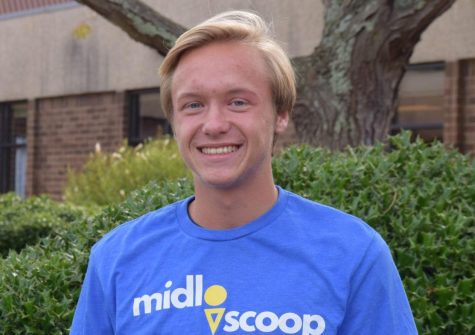In an Eastern Orthodox Church in the Powhatan countryside, the clock strikes 11:00 p.m. and churchgoers wrapped in foreign headscarves with wax candles in-hand begin to enter the doors of the lightless churchouse. In a towering outdoor white tent, tables were decorated full of wood-woven Easter baskets, each filled with an assortment of cakes, cookies, cheeses, meats, wines, and red-dyed hard boiled eggs. This was just the beginning of the celebration I came to know as Pascha.
Pascha (Pas-kah), the Russian word for Easter, is the Orthodox celebration of the resurrection of Jesus Christ, which takes place exactly one week after the usual Catholic Easter. Orthodoxy is a branch of Christianity that branches away from Catholicism and continues to remain unchanged since its creation. Every Orthodox church in the world abides by the same schedule of services using the Julian Calendar and each church follows strict guidelines of worship to ensure the religion remains the same as it was intended so by its creators several millennia ago.
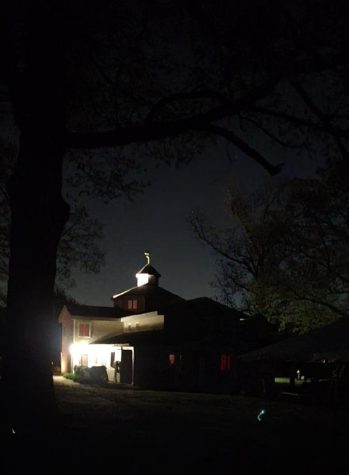
Saturday night on April 15, my friends Katie Lavender and Nickolas Forest came to my house for what I nick-named “Pascha Prepping”. It was about 5:00 p.m. as we scattered throughout the kitchen pulling together an assortment of homemade bread, Napoleon cake and chocolate chip cookies. After hours of baking and a short nap, it was 10:50 p.m. and before we knew it, it was time for church.
We walked into St. Cyprian of Carthage, the small yellow church we had been attending since last summer, and were surprised to see the usually brightly-lit building encased in darkness save for the three burning candles in the center of the room.
George Munro, a Russian Proffesor at VCU, stood at the front podium, reading from a bible in a byzantine chant-style.
Byzantine chanting is one of the oldest forms of orally reading the bible which involves the exasperation of words and change of vocal tones.
Within the following half-hour, the church began to fill up with several families and new faces I had never seen. I learned that Pascha is one of the biggest celebrations in Eastern Orthodoxy, and it’s the one event of the year that nearly all Orthodox Christians attend.
Leading up to midnight, the church choir sang a series of somber Byzantine songs that created an sacramental echoing throughout the room. When the clock struck twelve, the candles were blown out and the church stood in darkness.
In Orthodox churches, there are very few chairs and churchgoers are to stand for the duration of the service. This is because standing during the service creates active participation, while sitting can be seen as “entertainment” for passive spectators.

At midnight, amidst the pitch-black darkness, one candle was lit by the father of the church. He passed the flame of his candle onto the candle of a choir member. From there, there were two lit candles. Then, four, then ten, then twenty, and within minutes the entire church was united by the same flame. A church that was encased by darkness moments before was now glowing in orange flames.
Then, just like the time Moses split the Red Sea, the entire church created a division down the middle. The Father, followed by the Deacon and the altar boys, carried a gold cross that had three wax candles. Behind them, churchgoers created a line and processed outside around the entirety of the church building while singing a byzantine chant.
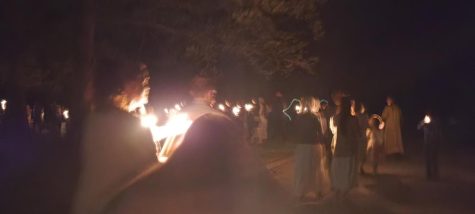
After walking full-circle, the Pascha crowd waited outside the doors of the church while the Father said a blessing. Then, the doors were opened to reveal a church lit entirely by the overhead chandeliers and the words “Christ is Risen!” were shouted.
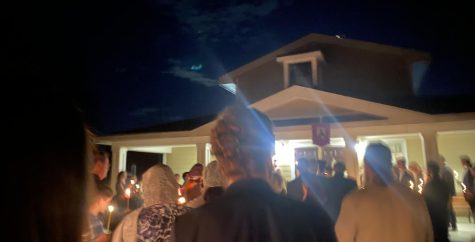
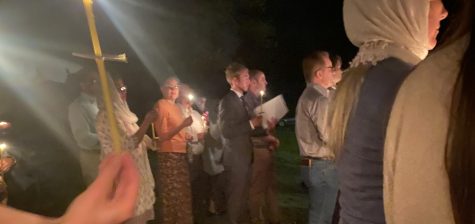
Then the choir sang a variety of uplifting songs and chants, followed by the head of the church reading a series of passages from the liturgy book and the bible. Towards the end of the service, lines were formed to receive communion and venerate the Orthodox Icons.
Icons are a symbol of the Orthodox church that represent the living forms of Christ in the flesh. They are believed to be different comings of Christ, and are venerated through the sign of the cross and a bow of the head. Communion is received the same as Catholiscim with bread and wine.
The entire service was an oral history of Christ’s legacy surrounding the Pascha holiday beginning with his crucifixion and ending with his resurrection.
Throughout the service, the Father would shout “Christ is Risen!” and others would respond with “Indeed He is risen!” which would practically shake and echo throughout the small church. At 3:30 a.m., the service ended in unison with a final “Christ is Risen!”
Because Orthodoxy is such a widely practiced religion, “Christ is Risen!” was also shouted in Greek and Russian to accommodate to the foreign demographic of people.
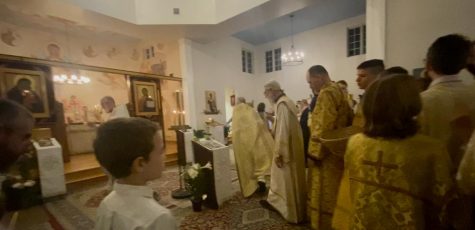
Churchgoers hugged and kissed each other in celebration after the conclusion of the Paschal service. Outside at the tent, Easter baskets that were filled with foods and drink were blessed from a bowl of holy water by the Father. Then for the following hour, friends and family celebrated and dined on the foods that they couldn’t for the previous 40 days of lent.
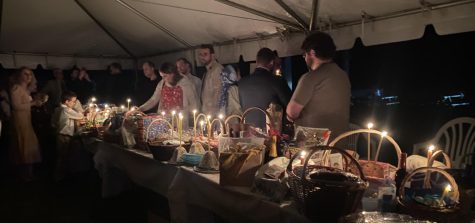
Many Orthodox Christians choose to fast for the 40 days of Lent, known in the Orthodox Church as “The Great Fast” which includes the exclusion of meats, cheeses, milk, eggs, dairy and other animal products. The celebration of Pascha is the end of the fasting period, which is why it is celebrated Saturday night and into the following Sunday.
At 4 a.m., Katie, Nick and I left church after an hour of eating cake, cookies, soup, bread and more. The next morning, there was no regular Sunday service, and instead a short afternoon service followed by a celebration potluck.
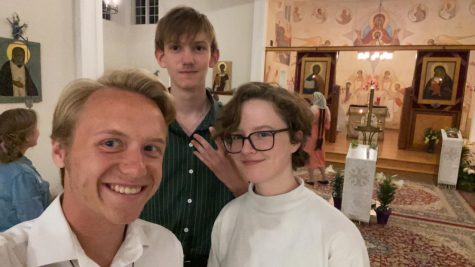
It was my first time attending Pascha and I will forever remember the magical feeling of the special celebration. It was an eye opening experience for me and gave me a unique opportunity to learn about other cultures and religious practices.








